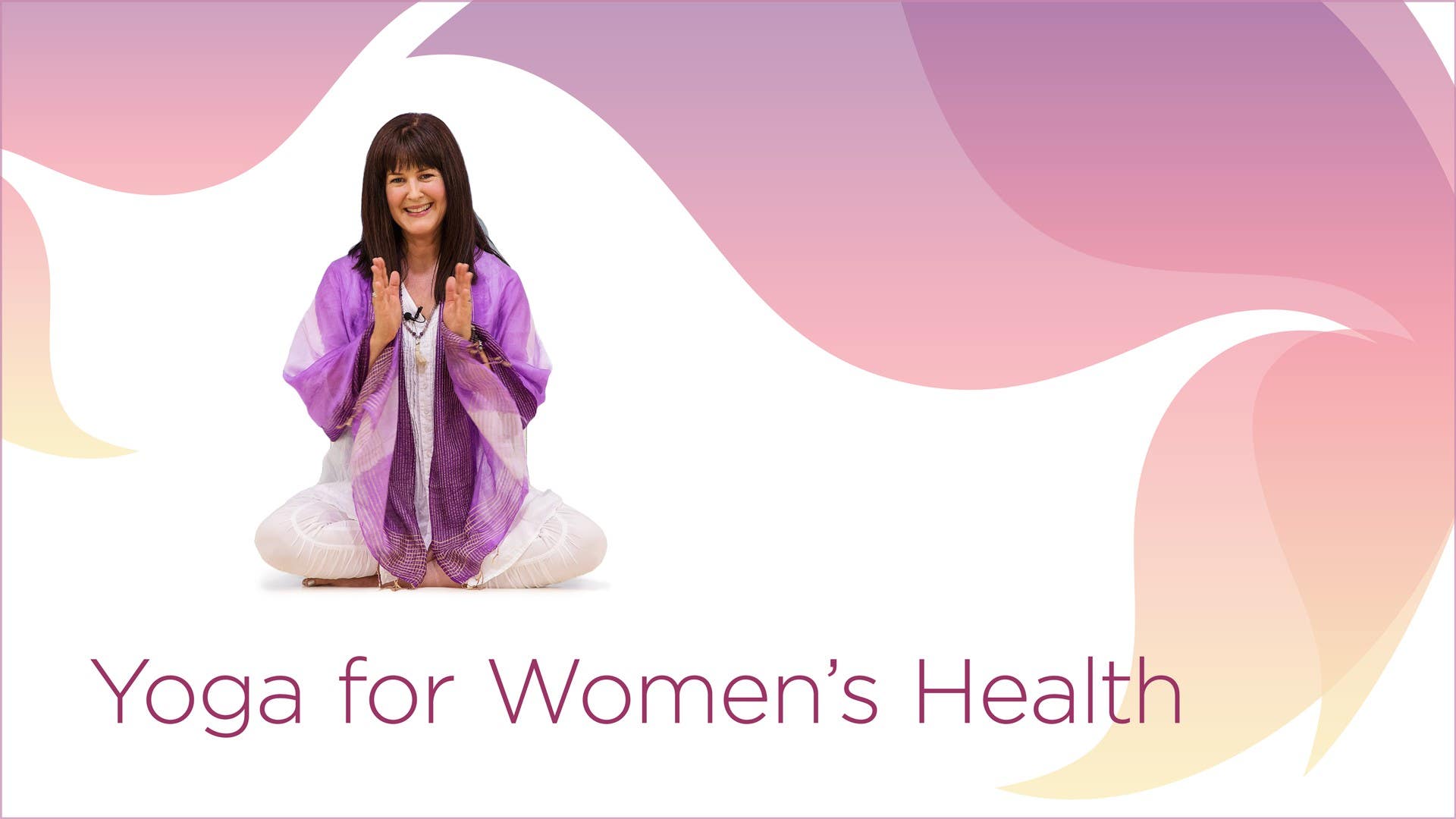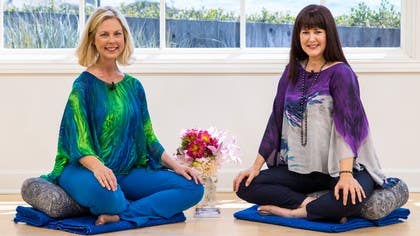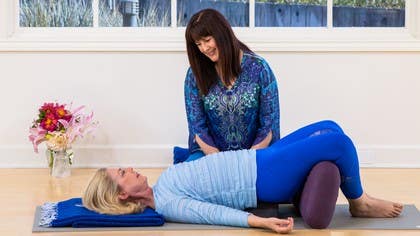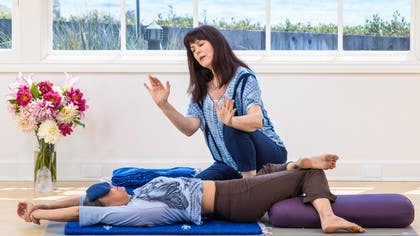Description
About This Video
Transcript
Read Full Transcript
Hello and namaste. Elizabeth and I are continuing our conversation. Today we'll talk a little more about sexual health in relation to menopause and perimenopause and this later period in your life. So in looking at sexual health and healing for ourselves as women going through this time in our life, perhaps you've had your children, maybe your kids have grown up and gone off to school or depending on what's going on in your life, some women start their perimenopause at 40, some earlier, depending on if it is treatment related, you've lost your ovaries, it may start earlier, or because of medical treatment. And many women by the age of 52 are heading really into full blown menopause.
And we thought there's a lot of physical changes in the body that, our sexuality changes. Our way of approaching our own sexuality, how we feel about ourselves change. Elizabeth, I'd love for you to share a little bit about your own experience with that. Sure. So I was doing a pretty rigorous academic program and so very much sitting in a chair and in the mind.
And even thought it was research about the nerves, which really ended up being research about women, and it was really about the body and women and that the intelligence really comes from the body and much of my research surfaced from doing yoga practices, walking on the beach and really diving deep into my psyche. And so at the end of my research, I made a commitment to devote my time and energy to my body and my sexuality. I had come to a point midlife where my libido had decreased and I was determined to be sexual, to be orgasmic and multi-orgasmic and I took it on as a project. And I think, I have to say-- That's a good project. It's a good project.
And I've been pretty much focused on that for the last four or five years. And so how does that look? How do you approach that as a project? So today is actually my father's birthday, he would be 98 today. And the only education I had as a little girl about sexuality, it wasn't from my mother or grandmother, it was in my father's office and on the very, very top shelf way up high, there were some books that looked a little bit like they were about sexuality.
So I asked him about them and he said, "Oh, don't worry about that. "It's the man's job to pleasure the woman." Okay, so, this was what I thought, right? And this is very, you know, World War II vet. This is very much the thinking that we have been raised with. And the generations, it's surprising how long that takes to go away.
So, really, I didn't learn how to masturbate as a child because, you know, for whatever reason, I thought it was shameful. It was never verbally talked about in my family or anything like that. So I discovered, through my research from academia, Betty Dodson, as a reference at the back of one of the research articles I was reading and I looked her up. And you know, she's 87 years old now, but she was the renaissance woman really her whole life and she's still teaching. And so I went on her website, it's dodsonandross.com and she has explicit sex education which is just fabulous.
So I was like a 13 year old learning how to properly self-pleasure. And I learned and I found out I'm multi-orgasmic. Wow. Isn't that great? And so it's never too late.
And, in fact, this age, it's the sexual renaissance for me and it has been for the last five years. And so it doesn't have to go away, however, I think it's kind of a practice to self-pleasure, to take care of yourself, to say no if sex doesn't sound, if intercourse doesn't feel good, sound good, interest you at all. That's okay. A time of no sex is just fine if that's what your body wants. And getting to know what is it that feels good to me.
What do I like? What can I teach my partner when I have partner sex, how to be involved in my pleasure? Because my whole life was about pleasuring others, taking care of others. I'm a nurse. I take care of others.
I take care of my partner. And so now at this age, guess what? It's some of me time now. (laughing) That's wonderful. Yeah, and I think so many women feel that because of the menopausal symptoms, it's an ending and they start grieving.
Like I'm losing my libido. My vaginal lubricant isn't the same. And how do I work with that? So, then there's weakness in the pelvic floor, which can actually affect your orgasm. These are some of the things that in the practices for this season we'll be bringing in to help really generate some of that good energy and flow to enliven it for you rather than feel like you have to cut it off, you know, the death of that part of you, but it can actually be like a time of rebirth which is what you've expressed.
Yeah and for sure the lubrication is an issue for all women and not just menopausal women. I think everyone should use oil all the time. It increases sensitivity. So I like to use organic almond oil or coconut oil that doesn't have a scent. That's what's at my bedside currently.
And it's wonderful because if you have too much you just rub it on your body. It's a wonderful moisturizer. So just keeping it by your bedside, a little thing of coconut oil or almond oil, and I know at health food stores they sell it with rose essential oil. You can get it in sizes that are easy to travel with, but it's anything you would put in your mouth, I think is safe to say you could put on your vagina or in your vagina. I think that's a good thing to think about when you're using lubricants.
And as you said, we want to keep our body lubricated. And as that changes also things can tighten so I've talked to a lot of women in just doing research for this show about their experience. And I've had women say to me I can't be penetrated anymore. I'm having a terrible time even with my pelvic exams. And I was mentioning to someone recently, you can go to a physical therapist, that there are physical therapists that do internal pelvic release work.
This can also be really helpful for women who have UTIs, urinary tract infections, because sometimes it's actually the position of the urethra or the way that the bladder's sitting or if you have a prolapse that can create these kinds of problems, so getting that assessed. And then there's expanders that you can use for your vagina. But I think a great expander is a vibrator or a dildo or your own hands. And I know that people recommend doing that before birth, too. That you can stretch that area to prepare for birth, but it's the same as your body changes to work with it.
If your muscles get weak you want to strengthen them. And the pelvic floor muscles, if you work with them daily, usually within eight to 12 weeks, if you have incontinence issues, that will start to improve and that's for stress incontinence. So there's different kinds of incontinence. But these are wonderful things to talk about and to educate each other about and to work with to help our bodies to move into an easier place so that we can move through these times in our life with more grace. Yeah and speaking about the penetration pain, Betty Dodson has a barbell that she's created that is wonderful for a practice to strengthen the pelvic floor and also sometimes just doing kegels without something inside can make it too tight.
So this barbell, or anything that's inside, can help you to still do the kegels without getting too tight, especially if you're in a phase like that and it can be great for before partner sex as well to kind of get you warmed up. Yes, absolutely. Also, strengthening your core, your stomach muscles, can also increase your orgasmic ability. And the wonderful thing about women's sexuality, and I know you showed me this beautiful picture of a clitoris, and I had never seen one quite like that. And I said, right away, what I said, I said, "Boy, I'm sure glad I have one of those." Exactly, it's remarkable and it's really amazing that we haven't really known what we know now about the clitoris.
And you know, often times we'll say, vagina and I like to think of the vagina as the birth canal. And of course, there are a lot of pleasure spots within the vagina as well and with penetration, sex, it can be wonderful. However, the real stimulating area for women is the clitoris, that's the primary sex organ. The only reason that we have a clitoris is for pleasure and we think it's tiny, but it's really not. It's about eight inches and it's all internal, most of it.
And that is all erectile tissue and it gets swollen just like in males. And so it's just remarkable and that takes a little bit longer to get swollen than a man and so it's important for that to happen during sex, is to have time for all of that engorgement and wonderful juiciness to happen. Yeah and I know you and I have been talking about the media and film and how women are portrayed and how sexuality's portrayed, and that can be a difficult thing when you see in a film, well, boy, there's no foreplay and they just go at it. And, you know, women tend to actually to really be orgasmic, need a lot more foreplay. And I know for me, my husband and I, as I started to head into menopause, he said, I feel like I'm with a new woman.
And he didn't say it in a mean way. It was really honoring the fact that my body needs a different kind of touch. It needs a different kind of attention now. And so it's been wonderful to explore that. You know?
Yeah, my husband, too, he's been very patient and very eager to learn what I'm learning and just wonderful. The other thing I think that's important, and I'm glad you brought up the advertising world and also pornography, I mean, unfortunately the only education that young people are getting, well, all ages really, is pornography and it's very male focused and not really how women respond to sexuality. So I think it's important, and also, I'm thinking about the vulva and the different styles of vulva. There are so many types and so beautiful and everyone is so different, and our anatomy is very different, and in honoring that is just so beautiful because if you think about pornography, everybody looks the same. And how sad when really we're all so unique.
There's no one like us in any way. And it's really beautiful, beautiful. Yeah and what we enjoy sexually can be so unique. What turns us on mentally. What touch triggers that pleasure.
And in that, you know, one of the things that happens when you live as long as we have, is you go through some stuff. You know, you have surgeries and you have injuries and you go through a fair amount of trauma and pain in the physical body and that's one reason I think it's so important to have pleasure, to find what pleasures you and to make, you know, to commit time to yourself and to nurturing yourself and doing those things. I find yoga to be incredibly sensual. You can bring in self-touch and feathering touch and breathing and breathe into your yoni and you know, let all that energy really enliven you. And also knowing that when we do have traumas or we do have suffering or we do have pain and discomfort in our body, that that too shall pass.
And that the body is also a source of pleasure. And boy, when it's a tough time just being with that and doing the best you can to take care of yourself, but knowing it's going to come back. The pleasure will come back. I was in the ICU four years ago, as you know, very, very sick and four years later my body has rebounded and I'm doing fine again. That's life and we've talked about this so much that it comes and goes and it's really wonderful to appreciate the pleasures of the body as much as possible.
Absolutely, it's an incredible living organism and it heals and it regenerates. Also, I just want to encourage you to eat well, to nourish yourself with healing foods. Healthy foods make a huge difference. Some supplements can really be helpful for menopause as well and certainly your yoga, your meditation and your friendships. Yes, absolutely.
Thank you so much for being here. Thank you. And thank you everyone. Wishing you ease and fun and sexual health and healing. Blessings.
Namaste.
Yoga for Women's Health: Cheri Clampett
Comments

You need to be a subscriber to post a comment.
Please Log In or Create an Account to start your free trial.













